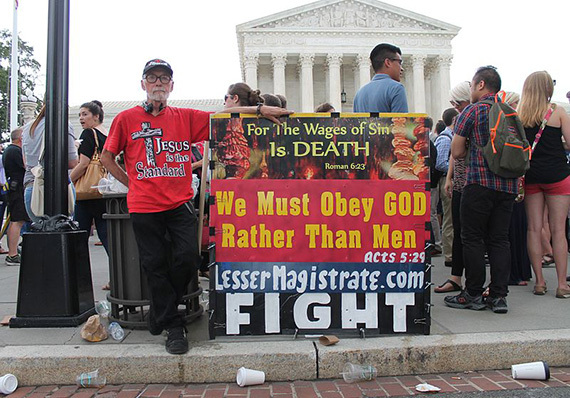
Marriage Equality Decision Day Rally in front of the US Supreme Court, 26 June 2015, photo by Elvert Barnes. Creative Commons license.
The Pew Research Center's Religious Landscape Study is beginning to sound like a broken record. Each new report reveals that the portion of religiously unaffiliated Americans is growing and that young people are considerably less conventionally religious and more agnostically inclined than their elders. In 2014, Pew reported that 23 percent of all Americans fall into the no-religious-affiliation demographic (the "nones"). Among 18-33-year old Millennials, it's 35 percent. Religion dropouts are everywhere these days.
Recently, I had the opportunity to engage with nearly 1,600 ex-Christians who completed an extensive survey about their Christian background and the whys behind their deconversion -- rejection of faith for agnosticism or atheism. Five denominational dysfunctions were consistently cited: doctrines like inerrancy of Scripture; suspicion of science; failure to keep up with the culture; conservative politics; and anti-gay religious rhetoric flowing from conservative pulpits. That final matter is particularly relevant for LGBT Americans.
Conservative Christianity in America remains largely opposed to LGBT inclusion in matters of faith, doctrine and community, insisting as it does upon an interpretation of the Bible that excludes LGBT members from full participation in the life of the church. Pulpit-hammering sermons against gays still play well in these churches, and in certain political circles, but many congregants -- LGBT, their allies and the under-40 faithful -- aren't going to take it anymore. Most of the deconverted ex-Christians who responded to my survey indicated that their liberal views about homosexuality vis a vis their church's conservative teachings played a significant role in their decision to leave Christianity.
Unfortunately, the research shows, conservative Christianity is a repressive overlord for many LGBT believers. One respondent to my survey, a twentysomething bisexual woman, wrote that losing her religion was "a weight off my young shoulders." A thirtysomething woman reported that "the single biggest issue in rejecting Christianity was knowing that in my natural state, I am bisexual. If I was created deliberately by god, why would he create someone he would hate?"
Heterosexual allies also suffer spiritual pain when segregated from their LGBT friends and family members by religious Jim Crowism: "I struggled with the way my faith was making me act like a jerk"; "[The issue of homosexuality] is another example where I found the Christian religion and the Bible to be immoral"; "If I had to pick a single cause for my deconversion, this would be it"; "I hated hating people." One primarily heterosexual twentysomething female speaks for many LGBT-allied ex-Christians:
I sat in church one Sunday and the pastor called homosexuals an abomination in the eyes of God. It ripped my heart to shreds, as I saw the face of each and every one of my homosexual friends flash through my mind. I thought to myself, how dare you! How dare you sit in judgment of your fellow human beings! . . . I couldn't justify aligning myself with his view of homosexuals, and this played a massive part in my deconversion.
Among the formerly conservative-fundamentalist ex-Christian heterosexuals I interviewed, 51 percent reported that their church's conservative doctrines on homosexuality contributed to their deconversion, with 32 percent stating that this issue was "very important" or "somewhat important" in their decision to leave religion. Among formerly conservative-fundamentalist ex-Christians who are LGBT, 66 percent report that anti-homosexual theology contributed to their decision to deconvert, and 59 percent claim that it was a "very important" or "somewhat important" factor.
The writing is on the wall. Conservative Christianity is killing God for some LGBT Americans and their allies. There's a choice to be made. If conservative Christians wish to remain culturally relevant, if they want a voice in the marketplace of ideas, if they desire to play a significant role in public life, they must reconsider their positions on a host of issues, not least of which is how they treat their LGBT neighbors whom Jesus taught them to love as much as they love themselves.
Rodney Wilson holds master's degrees in history and religion and teaches both at a community college in Missouri. His book, Killing God: Christian Fundamentalism and the Rise of Atheism, is based on his graduate thesis and is available on Amazon.
